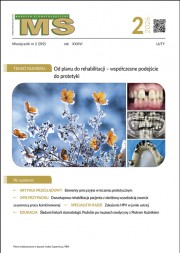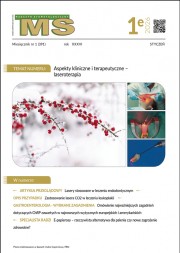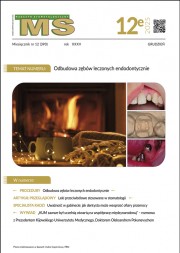Dostęp do tego artykułu jest płatny.
Zapraszamy do zakupu!
Po dokonaniu zakupu artykuł w postaci pliku PDF prześlemy bezpośrednio pod twój adres e-mail.
Clinical evaluation of stabilization of two-phase DIO® dental implant using the Periotest® device at measurement points of increasing range away from the implant platform
Właściwości biomechaniczne wszczepów zębowych, różne od właściwości zębów naturalnych, znajdują się w centrum uwagi lekarza planującego leczenie implantologiczne. O mikroruchomości wszczepu, która jest niewielka w porównaniu z ruchomością zęba naturalnego, decydują właściwości tkanki kostnej w miejscu implantacji. Celem badania była ocena stabilizacji wszczepu dwufazowego DIO® Implant z użyciem przyrządu Periotest® w różnych punktach pomiaru o zwiększającej się odległości od platformy wszczepu. Do przeprowadzenia badania wybrano jeden wszczep w pozycji zęba 42 u pacjenta z brakami częściowymi uzębienia. Do pomiaru użyto transferu wyciskowego. Otrzymane wartości pomiarów upoważniają do stwierdzenia, że ruchomość bezwzględną wszczepu pogrążonego dobrze jest oceniać klinicznie w miejscu położonym jak najbliżej połączenia z platformą wszczepu. Wartość pomiaru PTV (Periotest value) rośnie wraz z odległością punktu pomiaru od poziomu kości otaczającej wszczep. Do klinicznej interpretacji wartości PTV pomiaru niezbędna jest znajomość odległości punktu pomiaru od poziomu kości otaczającej implant.
The biomechanical properties of dental implants, different from those of natural teeth, remain at the centre of attention of the dentist planning implant treatment. The properties of the bony tissue at the place of implant decide on the micro-movement of the implant, which is very small in comparison mobility of the natural tooth. The aim of the study was to evaluate the stabilization of the two-phase DIO® Implant implant with the use of the Periotest® device at various measurement points of increasing range away from the implant platform. For the study, one dental implant was selected from the place of tooth 42 in a partially edentulous patient. An impression transfer was used for the measurement. The values obtained allow it to be said that, for the absolute mobility of the implant under load, it is good to make the clinical evaluation in a place situated as close as possible to the platform of the implant. The measurement of the PTV (Periotest value) increases together with the distance of the point of measurement from the level of bone surrounding the dental implant. For clinical interpretation of the PTV value, it is essential to know the distance of the point of measurement from the level of bone surrounding the implant.













